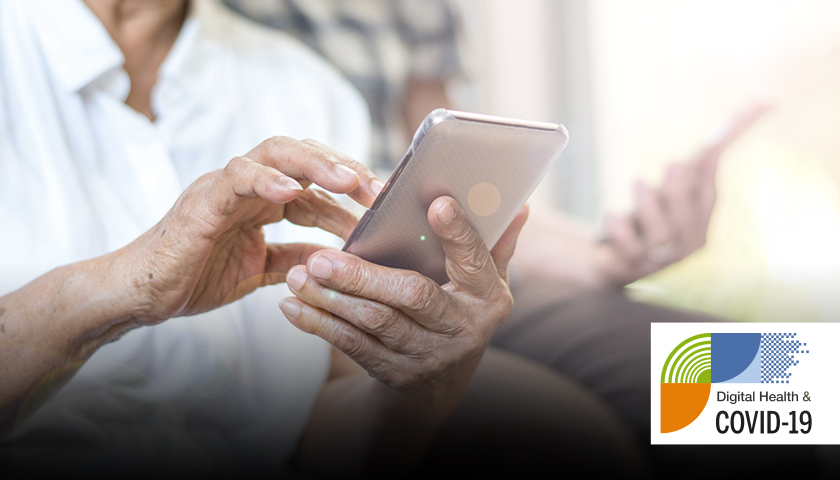BMS launches digital Advocacy Exchange for patient groups affected by COVID-19

Bristol Myers-Squibb and digital health firm GRYT Health have teamed up to develop an ‘Advocacy Exchange’ virtual platform to unite patient advocacy organisations, patients, policy makers, healthcare practitioners and industry during the COVID-19 pandemic.
The COVID Advocacy Exchange will invite close to 100 global and local advocacy organisations across several disease areas to convene virtually in their common pursuit of supporting patients with serious diseases who are simultaneously navigating the pandemic.
The virtual platform will provide access to data and information, as well as the opportunity to participate in weekly live, interactive sessions to foster discussion and collaboration.
Continuing our series looking at pharma’s digital response to COVID-19, we spoke to BMS’ executive vice president of corporate affairs, Kathryn Metcalfe, to learn more about the importance of bringing organisations together during these unpredictable times.
What is the COVID Advocacy Exchange and what are its main goals?
We developed the COVID Advocacy Exchange along with our partner GRYT Health as a virtual platform to unite advocacy organisations, patients and industry leaders in the exchange of information during and beyond this crisis.
The platform convenes advocacy groups across diseases with three main goals: to synchronise efforts, facilitate resource sharing with each other and with patients and affiliates, and allow for increased collaboration, both during the COVID crisis and over the long-term.
Participants have access to COVID-19-related materials from Bristol Myers Squibb, other advocacy organisations and third-party experts through an on-demand virtual exhibitor space and live meeting areas that host weekly interactive sessions.
Why is information exchange important for patients and life sciences companies at a time like this?
We’ve been in ongoing communication with the global patient advocacy community to understand how they are being impacted by the current crisis, and what resources they most need to continue to fulfill their missions.
The pandemic is impacting everything from daily operations and clinical concerns to the ability to conduct longer-term planning. Additionally, managing the inflow of COVID-related information and disseminating critical updates to affiliates and patients is further constraining limited resources.
Across the board, we have heard back that their biggest concerns are time and capacity constraints, infrastructure needs, and the lasting financial impact from the current crisis.
Groups have expressed strong interest in synchronisation, communication, and collaboration in navigating these unprecedented challenges, and now more than ever it is important to strengthen each other’s voices and illuminate our paths forward. The response from the global advocacy community has been overwhelmingly positive, with nearly 500 users from more than 40 countries registering so far.
Meanwhile, we have weekly live, interactive panel sessions shaped in response to the advocacy community’s needs. Each week, global advocacy leaders discuss a topic identified by the community as urgent in the current environment – for example, collaboration, clinical trial enrolment, telemedicine and access to care.
Our hope is for participants to come away with practical, actionable takeaways that they can implement in their daily operations at their individual organisations. Each session features an interactive chat function where participants can submit their comments or questions for the panelists, which has fostered additional collaboration and organic networking.
Are there any other kinds of collaborations like this you'd like to see happening during the pandemic?
The pandemic has illustrated how vital it is that we come together in order to make progress for something that is bigger than any one organisation, group, or geography. I have been awestruck at the collaborative responses across the globe, from individual communities to large organisations, all looking for new ways to reach out and be part of a solution. I would like to see industry, advocacy, policy, and other stakeholders throughout the healthcare continuum work together to solve problems and transform what health means for all people.
It is my hope that these open lines of communication and collaboration will continue long into the future. It will be important to continue providing up-to-date, credible information that can support advocates, patients, and providers to continue moving forward, as well as amplifying the voices of those working on the ground.
We must continue to listen to the patient and patient advocate communities to make this happen. Only collaborations driven by patient needs and insights will be sustainable over the long-term, and we are committed to continuing our efforts.
Do you think the pandemic will permanently change the ways patient organisations work?
I think we need to be prepared for lasting changes to the landscape for the foreseeable future, including an urgent need for sharing of information and best practices, and increasing comfort with digital platforms.
The COVID Advocacy Exchange was developed with this in mind, as a first-of-its-kind collaboration platform for patient advocacy groups worldwide, open to those from across disease areas. We will all need to continue evolving to navigate the post-COVID environment.
How would you like to see the Advocacy Exchange develop?
Since launching the platform just a few weeks ago, it has been encouraging to see the patient advocacy community adopt and help continue shaping this resource. Over the coming months, we hope to build upon and enhance the platform, in collaboration with our advocacy group partners, to create a lasting coalition and platform that will exist for the long-term and cover critical topics beyond COVID-19.
About the interviewee
 Kathryn Metcalfe is executive vice president, corporate affairs at Bristol-Myers Squibb. She is responsible for leading the company’s strategic communications across stakeholder groups, including internal and external communications, global advocacy, state and federal government affairs, and global policy. Kathryn is a seasoned communication professional who has held multiple leadership positions at major corporations and top agencies. She has been recognised by her peers as an innovator and was inducted into the PRWeek Hall of Femme, in addition to being included on several industry lists of top communicators.
Kathryn Metcalfe is executive vice president, corporate affairs at Bristol-Myers Squibb. She is responsible for leading the company’s strategic communications across stakeholder groups, including internal and external communications, global advocacy, state and federal government affairs, and global policy. Kathryn is a seasoned communication professional who has held multiple leadership positions at major corporations and top agencies. She has been recognised by her peers as an innovator and was inducted into the PRWeek Hall of Femme, in addition to being included on several industry lists of top communicators.












